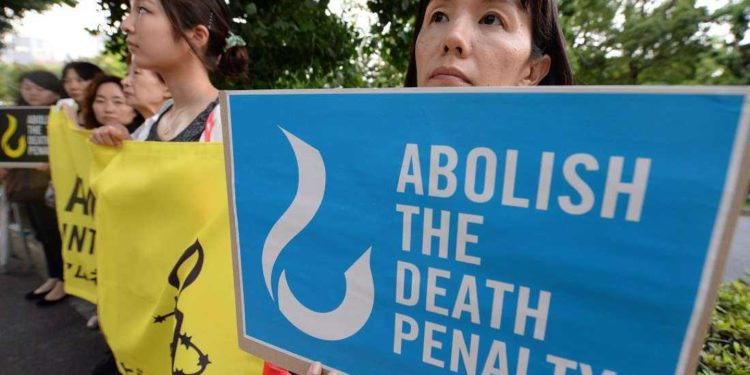One of Asia’s most advanced nations is tainted by a medieval criminal legal system
Members of civic groups hold banners denouncing the death penalty during a demonstration in front of the Justice Ministry in Tokyo on June 26, 2014. (Photo:AFP)
The review meeting of the UN Committee Against Torture in 2013 saw a heated exchange of words when one of the members said the criminal legal system in Japan resembled the Middle Ages. The Japanese ambassador, in turn, reportedly screamed at the member to shut up.
Though the UN committee reiterated its long-standing concerns over the lack of safeguards in Japan’s legal system, the then-prime minister, the late Shinzo Abe, dismissed it as not legally binding and Japan still maintains one of the oldest prison laws in the world and its secret ways of execution.
No matter what views one holds on the death penalty, it is without a doubt that the situation on death row in Japan is anything but humane.


Japan has only started to reveal the names of those executed since 2007, and the public still knows little about it as executions are handled in secrecy and family members learn about them only after they have taken place.
Executions in Japan are carried out by hanging, and the victim is only informed of the date of execution a couple of hours before being taken to the gallows.
This is ostensibly to ensure mental stability so that the victim eats every single meal not knowing if it will be his or her last.
“Once on death row, the victim is held in solitary confinement and contact with the outside is forbidden”
The authorities’ tall claims on the mental health of the victim are ludicrous, given the fact that even mentally incompetent persons have been executed in the country.
It is all the more silly when authorities claim that death row prisoners are kept in isolation to “ensure their emotional stability.”
Under the law, once on death row, the victim is held in solitary confinement and contact with the outside is forbidden.
In July this year, Japan executed a man convicted of killing seven people in Tokyo’s popular Akihabara district in 2008.
Tomohiro Kato went on a stabbing spree on June 8, 2008, telling police: “I came to Akihabara to kill people. It didn’t matter who I’d kill.”
Last year in December, Prime Minister Kishida Fumio gave the nod to the hanging of three death row inmates.
Currently, two anonymous prisoners sentenced to death in Osaka have launched an appeal against the secret death penalty. They say it deprives prisoners of their legal rights, and the chance to say goodbye to family or receive religious rites.
The government in Japan cites purported overwhelming public support for capital punishment and hanging as a justification. Going by government polls, more than 80 percent of Japanese are in favor of the death penalty.
“Police are allowed to keep the suspect in custody as long they wish before proceeding with the indictment”
Japan practices capital punishment under the Prison Law, adopted in 1909. This infamous legislation also provides for the substitute prison system known by its Japanese name, daiyou kangoku.
Under daiyou kangoku, police are allowed to keep the suspect in custody as long they wish before proceeding with the indictment. Bail before an indictment is still a difficult task in Japan.
Though a stop-gap arrangement during the rapid industrialization of the country, the practice was continued even after Japan became an industrial powerhouse.
Though human rights campaigners have been seeking to end capital punishment, there are few takers in the country and so political parties are not interested in championing it.
The practice of capital punishment has caused diplomatic difficulties for Japan. In 2021, when Australia and Japan planned a pact to allow their armed forces to operate together, Australia was worried that its soldiers in Japan could be subject to harsh penalties. Later, both nations agreed to resolve criminal incidents on a case-by-case basis.
Capital punishment is going out of style in the world as more than 70 percent of UN members have abolished the death penalty in law and in practice.
“The violence of the death penalty can never build a peaceful society”
Worldwide, Oct. 10 is marked as World Day Against the Death Penalty. But a few large Asian countries like China, India, Indonesia, Bangladesh, Pakistan, Iran and Saudi Arabia still practice it. The EU requires all its members to abolish the death penalty.
The Church in Japan has always demanded the abolition of capital punishment, saying: “the violence of the death penalty can never build a peaceful society.”
Among rich nations, the US and Japan are the only exemptions. US President Joe Biden has already hinted at ending capital punishment, but Japan is not bothered.
According to a letter addressed to the Prime Minister’s Office, the Japanese Catholic bishops’ Justice and Peace Commission said the death penalty is an “attack on the inviolability and dignity of personality” and “so is unacceptable.”
The letter was released on the occasion of the hanging of Kato last year.
How long can Japan tell the world community to shut up when questioned about its outdated legal system and its infamous way of hanging?
*The views expressed in this article are those of the author and do not necessarily reflect the official editorial position of UCA News.
Latest News
Credit: Source link




